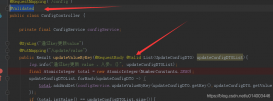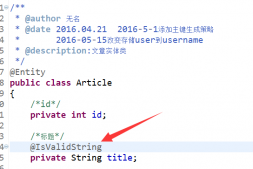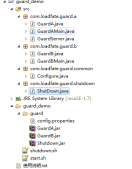Java API实现向Hive批量导入数据
Java程序中产生的数据,如果导入oracle或者mysql库,可以通过jdbc连接insert批量操作完成,但是当前版本的hive并不支持批量insert操作,因为需要先将结果数据写入hdfs文件,然后插入Hive表中。
|
1
2
3
4
5
6
7
8
9
10
11
12
13
14
15
16
17
18
19
20
21
22
23
24
25
26
27
28
29
30
31
32
33
34
35
36
37
38
39
40
41
42
43
44
45
46
47
48
49
50
51
52
53
54
55
56
57
58
59
60
61
62
63
64
65
66
67
68
69
70
71
72
73
74
75
76
77
78
79
80
81
82
83
84
85
86
87
88
89
90
91
92
93
94
95
96
97
|
package com.enn.idcard; import java.io.IOException;import java.sql.Connection;import java.sql.DriverManager;import java.sql.SQLException;import java.sql.Statement;import java.util.ArrayList;import java.util.List; import org.apache.hadoop.conf.Configuration;import org.apache.hadoop.fs.FSDataOutputStream;import org.apache.hadoop.fs.FileSystem;import org.apache.hadoop.fs.Path;/** * <p>Description: </p> * @author kangkaia * @date 2017年12月26日 下午1:42:24 */public class HiveJdbc { public static void main(String[] args) throws IOException { List<List> argList = new ArrayList<List>(); List<String> arg = new ArrayList<String>(); arg.add("12345"); arg.add("m"); argList.add(arg); arg = new ArrayList<String>(); arg.add("54321"); arg.add("f"); argList.add(arg);// System.out.println(argList.toString()); String dst = "/test/kk.txt"; createFile(dst,argList); loadData2Hive(dst); } /** * 将数据插入hdfs中,用于load到hive表中,默认分隔符是"\001" * @param dst * @param contents * @throws IOException */ public static void createFile(String dst , List<List> argList) throws IOException{ Configuration conf = new Configuration(); FileSystem fs = FileSystem.get(conf); Path dstPath = new Path(dst); //目标路径 //打开一个输出流 FSDataOutputStream outputStream = fs.create(dstPath); StringBuffer sb = new StringBuffer(); for(List<String> arg:argList){ for(String value:arg){ sb.append(value).append("\001"); } sb.deleteCharAt(sb.length() - 4);//去掉最后一个分隔符 sb.append("\n"); } sb.deleteCharAt(sb.length() - 2);//去掉最后一个换行符 byte[] contents = sb.toString().getBytes(); outputStream.write(contents); outputStream.close(); fs.close(); System.out.println("文件创建成功!"); } /** * 将HDFS文件load到hive表中 * @param dst */ public static void loadData2Hive(String dst) { String JDBC_DRIVER = "org.apache.hive.jdbc.HiveDriver"; String CONNECTION_URL = "jdbc:hive2://server-13:10000/default;auth=noSasl"; String username = "admin"; String password = "admin"; Connection con = null; try { Class.forName(JDBC_DRIVER); con = (Connection) DriverManager.getConnection(CONNECTION_URL,username,password); Statement stmt = con.createStatement(); String sql = " load data inpath '"+dst+"' into table population.population_information "; stmt.execute(sql); System.out.println("loadData到Hive表成功!"); } catch (SQLException e) { e.printStackTrace(); } catch (ClassNotFoundException e) { e.printStackTrace(); }finally { // 关闭rs、ps和con if(con != null){ try { con.close(); } catch (SQLException e) { e.printStackTrace(); } } } } } |
注意:
本例使用mvn搭建,conf配置文件放在src/main/resources目录下。
Hive提供的默认文件存储格式有textfile、sequencefile、rcfile等。用户也可以通过实现接口来自定义输入输的文件格式。
在实际应用中,textfile由于无压缩,磁盘及解析的开销都很大,一般很少使用。Sequencefile以键值对的形式存储的二进制的格式,其支持针对记录级别和块级别的压缩。rcfile是一种行列结合的存储方式(text file和sequencefile都是行表[row table]),其保证同一条记录在同一个hdfs块中,块以列式存储。一般而言,对于OLTP而言,行表优势大于列表,对于OLAP而言,列表的优势大于行表,特别容易想到当做聚合操作时,列表的复杂度将会比行表小的多,虽然单独rcfile的列运算不一定总是存在的,但是rcfile的高压缩率确实减少文件大小,因此实际应用中,rcfile总是成为不二的选择,达观数据平台在选择文件存储格式时也大量选择了rcfile方案。
通过hdfs导入hive的表默认是textfile格式的,因此可以改变存储格式,具体方法是先创建sequencefile、rcfile等格式的空表,然后重新插入数据即可。
|
1
2
3
|
insert overwrite table seqfile_table select * from textfile_table; ……insert overwrite table rcfile_table select * from textfile_table; |
java 批量插入hive中转在HDFS
稍微修改了下,这文章是通过将数据存盘后,加载到HIVE.
模拟数据放到HDFS然后加载到HIVE,请大家记得添加HIVE JDBC依赖否则会报错。
加载前的数据表最好用外部表,否则会drop表的时候元数据会一起删除!
|
1
2
3
4
5
|
<dependency> <groupId>org.apache.hive</groupId> <artifactId>hive-jdbc</artifactId> <version>1.1.0</version></dependency> |
代码
|
1
2
3
4
5
6
7
8
9
10
11
12
13
14
15
16
17
18
19
20
21
22
23
24
25
26
27
28
29
30
31
32
33
34
35
36
37
38
39
40
41
42
43
44
45
46
47
48
49
50
51
52
53
54
55
56
57
58
59
60
61
62
63
64
65
66
67
68
69
70
71
72
73
74
75
76
77
78
79
80
81
82
83
84
85
86
87
88
89
90
91
92
93
94
95
96
|
import java.io.IOException;import java.net.URI;import java.net.URISyntaxException;import java.sql.Connection;import java.sql.DriverManager;import java.sql.SQLException;import java.sql.Statement;import java.util.ArrayList;import java.util.List;import org.apache.hadoop.conf.Configuration;import org.apache.hadoop.fs.FSDataOutputStream;import org.apache.hadoop.fs.FileSystem;import org.apache.hadoop.fs.Path;public class Demo { public static void main(String[] args) throws Exception { List<List> argList = new ArrayList<List>(); List<String> arg = new ArrayList<String>(); arg.add("12345"); arg.add("m"); argList.add(arg); arg = new ArrayList<String>(); arg.add("54321"); arg.add("f"); argList.add(arg);// System.out.println(argList.toString()); String dst = "/test/kk.txt"; createFile(dst,argList);// loadData2Hive(dst); } /** * 将数据插入hdfs中,用于load到hive表中,默认分隔符是"|" * @param dst * @param contents * @throws IOException * @throws Exception * @throws InterruptedException */ public static void createFile(String dst , List<List> argList) throws IOException, InterruptedException, Exception{ Configuration conf = new Configuration(); FileSystem fs = FileSystem.get(new URI("hdfs://hadoop:9000"),conf,"root"); Path dstPath = new Path(dst); //目标路径 //打开一个输出流 FSDataOutputStream outputStream = fs.create(dstPath); StringBuffer sb = new StringBuffer(); for(List<String> arg:argList){ for(String value:arg){ sb.append(value).append("|"); } sb.deleteCharAt(sb.length() - 1);//去掉最后一个分隔符 sb.append("\n"); } byte[] contents = sb.toString().getBytes(); outputStream.write(contents); outputStream.flush();; outputStream.close(); fs.close(); System.out.println("文件创建成功!"); } /** * 将HDFS文件load到hive表中 * @param dst */ public static void loadData2Hive(String dst) { String JDBC_DRIVER = "org.apache.hive.jdbc.HiveDriver"; String CONNECTION_URL = "jdbc:hive2://hadoop:10000/default"; String username = "root"; String password = "root"; Connection con = null; try { Class.forName(JDBC_DRIVER); con = (Connection) DriverManager.getConnection(CONNECTION_URL,username,password); Statement stmt = con.createStatement(); String sql = " load data inpath '"+dst+"' into table test ";//test 为插入的表 stmt.execute(sql); System.out.println("loadData到Hive表成功!"); } catch (SQLException e) { e.printStackTrace(); } catch (ClassNotFoundException e) { e.printStackTrace(); }finally { // 关闭rs、ps和con if(con != null){ try { con.close(); } catch (SQLException e) { e.printStackTrace(); } } } } } |
以上为个人经验,希望能给大家一个参考,也希望大家多多支持服务器之家。
原文链接:https://blog.csdn.net/kangkangwanwan/article/details/78915134















